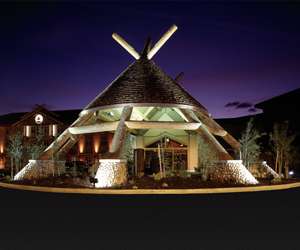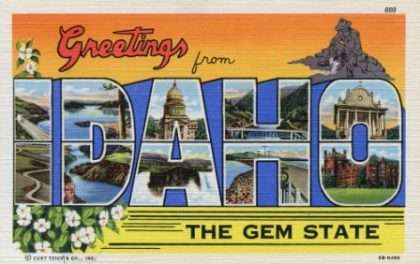Who Is Right in the Idaho, Coeur d’Alene Tribal Poker Battle?
Last Friday, the Coeur d’Alene Tribe opened a poker room at its casino in northwestern Idaho. Located less than an hour’s drive east of Spokane, Washington, the young poker room has so far garnered positive reviews. Governor C.L. “Butch” Otter is one person, however, who is not about to give it five stars on Yelp. On the same day the poker room opened, the office of the Governor announced that he and Attorney General Lawrence Wasden had filed a lawsuit in U.S. District Court to stop the tribe from offering poker at its casino.
But why, when the Coeur D’Alene Tribe already operates a legal casino, does Governor Otter have a problem with poker? It’s not even online poker, for pete’s sake. It’s live poker in a casino.
The press release issued by the Governor’s office made it pretty clear why this action was taken:
Under the federal Indian Gaming Regulatory Act (IGRA), Indian tribes are authorized only to offer those types of games that are legal within the state where they are operating. The Idaho Constitution prohibits poker, classified under IGRA as a Class III game. That restriction is detailed in the Coeur d’Alene Tribe’s gaming compact with the State, which is required for operation of a tribal casino under IGRA.
Coeur d’Alene Tribal Chairman Chief J. Allan, though, told the Spokesman-Review that the state has “a misunderstanding of both the games that the Tribe plans to offer and the Tribe’s federal rights under the Indian Gaming Regulatory Act.”
He added, “We believe we are well within our right to offer poker. If the state has a problem with our legal analyses, they can invoke dispute resolution under our gaming compact – that’s why we have it – so we can negotiate our differences in a professional setting.”
Both parties are looking at the same law, but interpreting it differently. So who is right? Let’s take a look. Before I start, though, I should warn you that I am not a lawyer (despite my mom’s wishes), so if anyone sees something horribly wrong in my brief analysis, feel free to let me know.
Indian gaming is governed by the Indian Gaming Regulatory Act of 1988, the same Act referenced by the Governor’s office above. The Act was put into place as both a way to protect the economic interests of Native American tribes and establish the legislative basis for gaming operations tribes may want to start.
Of importance to the Idaho situation are the three classes of games described in IGRA:
• Class I – traditional Indian gaming, often related to tribal ceremonies and celebrations, as well as “social games solely for prizes of minimal value.”
• Class II – bingo
• Class III – all forms of gaming that don’t fall under the other two classes.
Class III gaming is the sticky point. As it includes everything not in Classes I or II, casino gambling such as craps and blackjack falls into this category. Most seem to reasonably determine that poker is also one of these games, as, unless maybe you’re talking about bar poker games that award food prizes, poker is clearly a type of game that doesn’t qualify as Class I or Class II.
Tribes are pretty much free to offer Class I and Class II games however they would like. In order to run any Class III game, though, three things must be in place:
1. The game in question must be legal in the state where it will be offered
2. The tribe and the state must have entered into a compact.
3. The tribe must have an approved gaming ordinance.
On April 15th, 1992, the Coeur d’Alene Tribe asked the state of Idaho to enter into negotiations for a tribal-state compact for Class III gaming, a compact which would satisfy the second point above. Had the compact been signed by both sides at or around that point, the tribe might have been allowed to offer poker at its casino right now. But that didn’t happen.
At the time the compact negotiation was requested, Article III, Section 20 of the Idaho constitution read as follows:
Gambling not to be authorized. — No game of chance, lottery, gift enterprise or gambling shall be authorized under any pretense or for any purpose whatever, except for the following:
a. A state lottery which is authorized by the state if conducted in conformity with law; and
b. Pari-mutuel betting if conducted in conformity with law; and
c. Charitable games of chance which are operated by qualified charitable organizations in the pursuit of charitable purposes if conducted in conformity with law.
In the summer of that year, the state legislature proposed an amendment to Idaho’s gaming law during a special legislative session. That amendment passed in November 1992, changing Section 20 to this (emphasis added):
GAMBLING PROHIBITED. (1) Gambling is contrary to public policy and is strictly prohibited except for the following:
a. A state lottery which is authorized by the state if conducted in conformity with enabling legislation; and
b. Pari-mutuel betting if conducted in conformity with enabling legislation; and
c. Bingo and raffle games that are operated by qualified charitable organizations in the pursuit of charitable purposes if conducted in conformity with enabling legislation.
(2) No activities permitted by subsection (1) shall employ any form of casino gambling including, but not limited to, blackjack, craps, roulette, poker, bacarrat, keno and slot machines, or employ any electronic or electromechanical imitation or simulation of any form of casino gambling.
The Coeur d’Alene tribe took great exception to this change in the midst of negotiations. While the language in both versions of Section 20 seems similar, it was the straight-up prohibition of almost all Class III gaming that made the tribe’s collective head steam. The tribe felt this was an underhanded move. Though the previous iteration of the law looked like it outlawed Class III, there may have been some wiggle room as the tribe expected to be able to negotiate for Class III gaming permission. But now the state changed the law during negotiations to clearly and explicitly prohibit most Class III gaming, something that did not smell kosher at all.
Thus, the Coeur d’Alene tribe and Idaho negotiated a partial compact, leaving out Class III gaming, as they could not come to an agreement on that issue. The two parties asked a U.S. District Court to rule on their legal rights under IGRA. Long story a little bit shorter, the Court ruled in favor of Idaho, saying that there was nothing in IGRA that said the state could not change the law during compact negotiations. Among other points the Court made, it also refuted the tribe’s claim that the state changed the law to give it an advantage in statewide gaming over the tribes. Because the prohibitions in Article III, Section 20 of the constitution prohibited the stated forms of gambling for everyone, everyone was on an equal playing field. Just as the tribe couldn’t offer things like blackjack, craps, and poker, neither could the state. The compact was finally signed after the Court’s ruling.
Fast forward two decades later and we’re at the present juncture. The Coeur d’Alene Casino has opened a poker room and Idaho has filed a lawsuit to stop it. Who is right? Unfortunately, it seems to me that, given the law, the state should win this battle. IGRA states that to offer Class III gaming, which poker clearly is, the game must be legal in the state. In Idaho, poker is explicitly illegal and therefore would not be allowed in the tribal casino under IGRA.
For some reason, I have this odd bit of hope that the attention brought to the sketchiness of the law change in 1992 and the two parties’ desire to avoid a legal battle might bring about new compact negotiations, but the more I think about it, the sillier that seems. It would require the state government to basically admit what it did wasn’t cool, plus the law would have to be amended yet again. I suppose it’s not impossible, but it is not likely to happen.



















COMMENTS